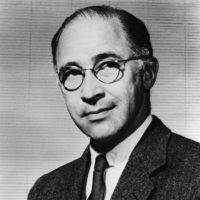
George Wald
Harvard University
For achievements in explaining the physiology of vision in man.
Whenever scientists review their understanding of the physiology of vision or of the functional role of vitamin A, the contributions of George Wald have a prominent place.
His explorations had an auspicious beginning. Basic training at New York University and Columbia University was followed by a National Research Council fellowship for advanced study in Berlin, Heidelberg, Zurich and Chicago. Since 1934, he has been a member of the faculty at Harvard University in the Department of Biology.
Although Dr. Wald's research papers have been singularly related to one specific field of investigation—the chemistry of vision—the range of his interest has not been narrow. Rather, it has had a delightful penetration into comparative biochemistry, evolution, ecology, the essentials of good teaching, and a keen appreciation of the art of living on a high plane. His discoveries have been especially valuable in identifying specific reversible reactions within the eye in response to light. Visual purple and other compounds were thus related to vitamins A1 and A2, and these in turn were associated with the early sea or fresh water environment of the organism.
He has given mankind a new picture of one of the most treasured gifts of life—the capacity to see.
